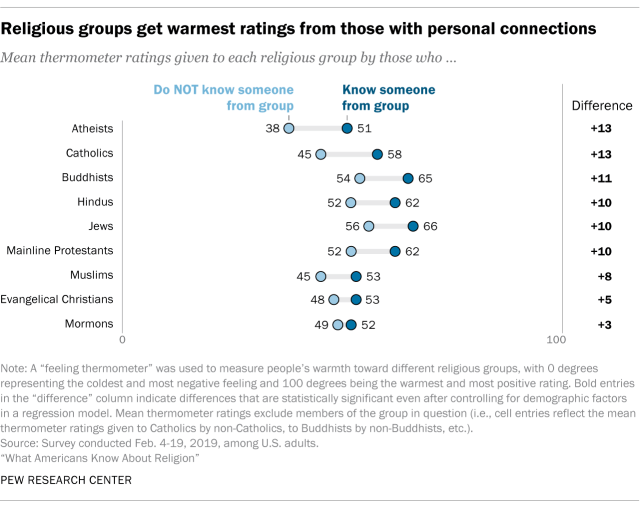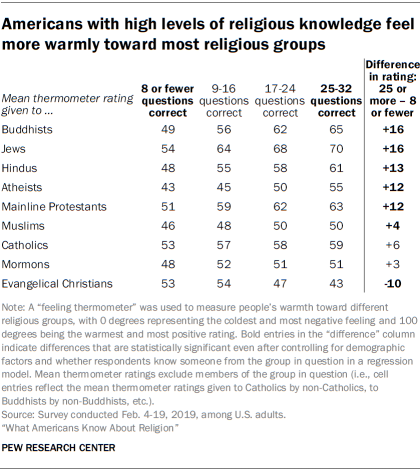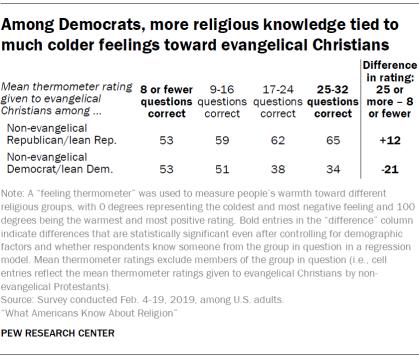Americans who personally know someone in a religious group different from their own – or who have at least some knowledge about that group – generally are more likely to have positive feelings about members of that group than those who don’t, according to a recent Pew Research Center survey.
The survey employed a “feeling thermometer” to measure people’s warmth toward different religious groups, with 0 degrees representing the coldest and most negative feeling and 100 degrees being the warmest and most positive rating. Overall, U.S. adults gave the highest ratings to Jews (mean rating of 63 degrees), Catholics (60) and mainline Protestants (60), and the coolest ratings to Mormons (51), atheists (49) and Muslims (49).

Those who know someone in a particular group – but are not themselves members of it – have warmer feelings toward that group than those who don’t. For instance, non-Buddhists who say they know a Buddhist rate Buddhists 11 degrees higher on the thermometer, on average, than those who say they don’t know someone of that faith tradition (mean rating of 65 vs. 54 degrees). Similar gaps exist when it comes to Catholics and atheists (a 13-degree difference in each case) as well as Hindus, Jews and mainline Protestants (10 degrees each). The same pattern holds for views toward Muslims, evangelical Christians and Mormons.

In many cases, a similar dynamic is at work when we break out the differences between those who do and don’t know a lot about a certain religious group, as measured by fact-based knowledge questions about that group. For instance, non-Buddhist Americans who correctly answered two survey questions that tested knowledge of Buddhism (concerning the religion’s “four noble truths” and its position as Thailand’s largest faith tradition) express warmer feelings toward Buddhists than those who gave the wrong answer in both cases (mean ratings of 67 vs. 53 degrees on the feeling thermometer). Likewise, those most knowledgeable about Hinduism, atheism and Judaism also have warmer feelings toward Hindus, atheists and Jews, respectively, than those with little or no knowledge about these topics.
Those who have more knowledge about religion in general also tend to have warmer feelings toward various religious groups they are not a part of. Americans who correctly answered at least 25 of the 32 religious knowledge questions in the survey are much more likely to have positive feelings toward Buddhists, Jews, mainline Protestants and other religious groups than those who answered eight or fewer questions correctly. For example, those correctly answering 25 or more religious knowledge questions gave Hindus an average thermometer rating of 61 degrees, compared with those who answered eight or fewer questions correctly (a mean rating of 48).

One exception to this pattern involves evangelical Christians. U.S. adults who answered 25 or more questions correctly actually feel colder toward evangelicals than those who got eight or fewer questions right, with average ratings of 43 and 53 degrees respectively.
Some differences when it comes to evangelical Christians are linked to party affiliation or preference. Non-evangelicals who are Republican or who lean toward the GOP follow the same pattern that U.S. adults do with other religious groups: Those who answered more religious knowledge questions correctly are more likely to feel warmly toward evangelicals. Among non-evangelical Democrats and Democratic leaners, however, those with higher levels of religious knowledge have much more negative feelings toward evangelicals.
Note: See full topline results and methodology.